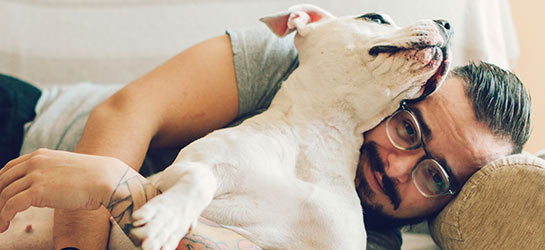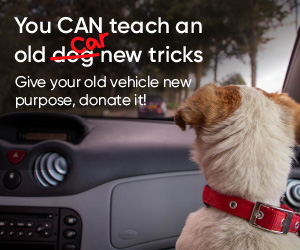Companion pets help people, military veterans included, in various ways and through many life stages. Among well-established physical benefits are lower cholesterol, blood pressure, and triglyceride levels, while emotional impacts include fewer feelings of loneliness and depression.
While not every circumstance is unique to military service, there are distinct moments in a veteran’s life when a companion pet might be just what the doctor ordered.
Transitioning from service to civilian life
Many veterans upon separating from service feel lost without the structure, discipline and routine associated with military culture. Some return to a life that they no longer recognize. Still others feel disconnected even from close friends or family and many struggle to translate their military skills into a civilian job.
Overall more than a quarter of veterans report difficulty re-entering life after the military. This figure is higher among post-9/11 veterans, as well as those who were seriously injured or experienced a traumatic event. 
For many of these veterans, companion animals provide the routine and discipline that they experienced in the military, but find lacking in their post-service lives.
Caring for a pet provides structure and purpose – a reason to get up in the morning – and aligns with the mission focus and sense of duty that typifies military personnel.
Equally important, a pet is someone to talk to who always listens, always loves you and never spills your secrets. Veterans who have difficulty sharing their military experiences with even those closest to them are often able to talk to their four-legged friends.
Ease the impacts of PTSD, depression and anxiety
In 2010 more than 408,000 veterans sought treatment for Post Traumatic Stress Disorder, or PTSD. These cases are on the rise as more post-9/11 veterans return from combat deployments. Veterans coping with PTSD may experience a range of symptoms, including depression, anxiety, insomnia, difficulty relating to others, nightmares, panic attacks, and self-isolation.
For individuals whose symptoms are so severe that they rise to the level of disability, a mental health provider may prescribe a psychiatric service animal – sometimes called a “PTSD dog” – to help the veteran participate in the basic activities of daily life. However, the vast majority of veterans neither need nor qualify for a service animal, even if they have PTSD, depression or another psychological condition, but most can be helped by a companion pet (learn more about the difference between service animals and companion pets).
By demanding attention and affection, companion pets force their guardians to focus on the animal’s needs, displacing behaviors where people dwell on their own circumstances and problems. A pet’s needs demand action, whether it is to be fed, groomed or out for daily walks – and these demands and their immediacy (“pet me now”) help veterans coping with psychological trauma regain a sense of purpose, confidence and optimism in their lives.
Companion pets can even help veterans re-establish relationships with people by acting as a social bridge, leading some to call them “surrogate humans.”
Fill the void of a deployed love one
Deployments are stressful for both the service member and the family left behind. While a pet is not a replacement for a deployed service member, it can make life apart less challenging for all involved. Spouses or partners are comforted by a pet to help guard the home front and provide a much-needed sense of security.
For children, a dog or cat becomes a combination of sibling, friend and confidant with whom they can share fears about a parent’s absence. The very act of rescuing a pet through adoption makes children feel good, in addition to the positive effects companion animals have on their self-esteem. Much like with adults, pets help children ward off loneliness, boost confidence and develop a stronger sense of responsibility.
On the most basic level, however, pets provide an opportunity to share something fun, positive and happy – an antidote to deployment stress.
Provide friendship to individuals who are lonely or living alone
Being alone and being lonely aren’t the same thing, but the impacts of both can be reduced through companion pet adoption. Elderly veterans are more prone to both loneliness and depression, and a pet’s focus on the “here and now” – to be pet, fed, walked – provide both physical activity and mental stimulation that can be particularly beneficial to the elderly. Many shelters offer “senior for senior” programs for elderly people to adopt mature pets, which helps an animal that may be overlooked due to its age find a fitting home with a person who might no longer be able to keep up with a young, active pet.
Of course, not all veterans living alone – or who are lonely – are elderly. Even before recent studies that link loneliness with an exacerbation of potentially lethal conditions such as Alzheimer’s, obesity, diabetes and heart disease, loneliness was understood as the desire for intimacy with others. Companion pets provide that emotional closeness, as well as the unconditional love and acceptance we all need.
In the end, military veterans and their families aren’t the only ones who benefit from companion pets. Dogs and cats who were homeless, abandoned, neglected or even abused have a second chance at life. It’s one of those rare situations in life where everyone wins.
If you are a veteran considering companion pet adoption, see if we have a program near you.











Just helping to put together a ‘Paw support’ program in the UK – helping to pair up rescued dogs with veterans.
I will be working with a psychologist and a veterans project. More research needs to be done into this area.
I am a Royal Navy veteran and a Canine Behaviourist. The benefits of having a dog in you life are clear to me.
http://www.thecaninebehaviourist.co.uk
It is good to maintain the mental level of military veterans, they will get engage with pets hand feel happy along with a pet companion.
How can I find information regarding the steps involved in getting veterans affairs to be approve me to acquire a companion pet?
If every service man or women would each have a dog, just think how good each person would feel and all the dogs we can save from being put to death for no reason of their own.
What a great article! There are plenty of studies sharing the healthy benefits of owning a companion animal. What a perfect way for our veterans in need to stay active, connected, and social.
http://www.publiceye.com
Imagine a world where public safety runs on smartphones.